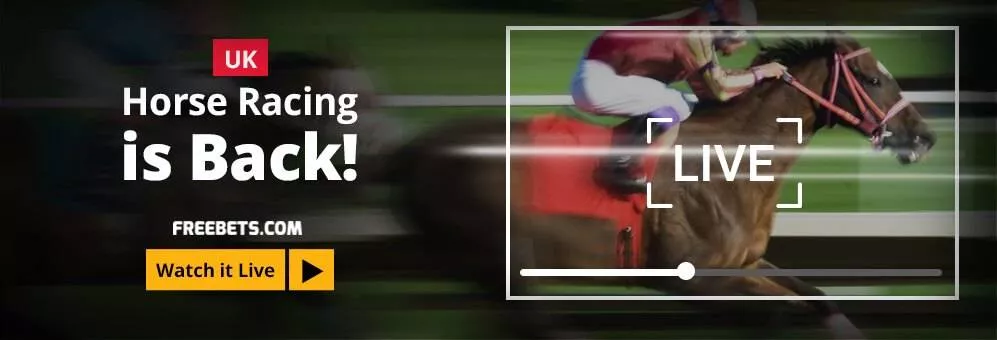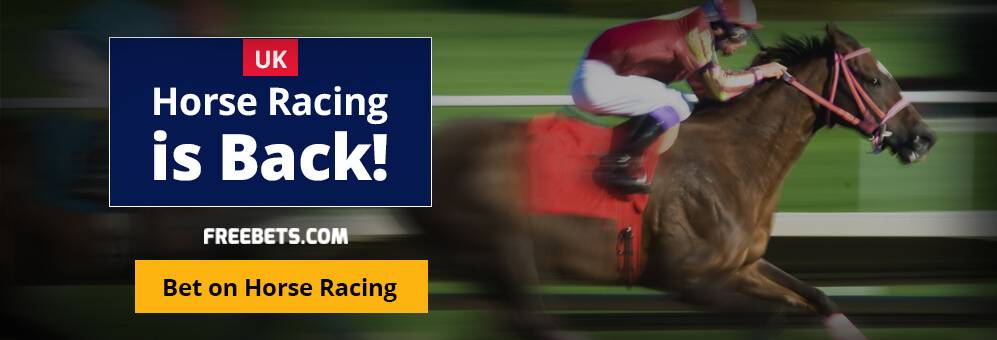Horse Racing Glossary & Betting Terms
 Craig Jones
Craig Jones
Horse racing is a sport with an incredible history.
With people racing horses for hundreds of years and the development of a large, international industry it’s little wonder that some people find it tough to understand all aspects of racing.
Many people find that the language of horse racing is the most impenetrable element of the sport which is why we have put together our Horse Racing Glossary for you below.
Abandoned: The term for a race meeting which has had to be called off (usually due to bad weather)
Accumulator bets: A multiple bet of four or more selections with bets paid out if every selection wins.
Added Weight: Can refer to the weight added to a horse via their handicap rating or to weight carried by a horse over what is required of a specific race (an overweight jockey for example).
All Age Race: A race with no restrictions on the age of the horses competing.
All Weather: Type of race track surface which is suitable for racing all year round. Three major types are Polytrack, Tapeta and Fibresand
Allowance Race: A race where the weights carried by the horses is set based on set factors including age, gender and wins at certain grades of races.
Allowance: A reduction in the amount of weight a horse must carry for a race, for example when ridden by an apprentice jockey.
Amateur: Jockeys who are not professional and so are not paid fees for their rides.
Ante-Post Betting: Betting markets priced up before the day of the race. Markets for big races such as the Cheltenham Gold Cup can be priced up a year in advance.
Apprentice: Jockeys who hold an Apprentice Jockeys Licence. Granted to jockeys who are employed by a trainer and aged between 16 to 26.
AQPS Horse – Refers to horses in France who are not Thoroughbreds but are involved in racing. Stands for ‘Autre Que Pur-Sang’ which translates to ‘Other than Thoroughbred’.
At The Post: A term used to indicate when horses are at the start ahead of a race.
Baby Race: Also known as a Juvenile Race, this is a race for two-year-old horses.
Banker: A very strong favourite could be described as a banker as they are seen to be certain to win.
Bearing In/Bearing Out: Describes a horse veering off course during a race.
Betting Ring: The area of a racecourse where the on-course bookmakers set up. Often actually ring-shaped.
Bit: A piece of equipment that is fitted into a horse’s mouth. Attached to the bridle, the bit helps jockeys control their horses
Bleeder: Horses who often bleed during races.
Blinkers: A piece of headgear fitted to a horse to reduce their peripheral vision and keep them focused on what’s ahead.
Bookmaker/Bookie: A person, organisation or company licenced to take bets either at a race course, via phone or online.
Boxed In: Describes when a horse is trapped either between or behind other horses in a race. Often used as a reason to justify why a horse failed to win.
Breather: A brief period during a race when a jockey will allow a horse to run at a slower tempo so as to allow them to fill their lungs and give maximum effort when asked.
Breeder: Individuals or organisations who breed racehorses.
Bridle: A piece of equipment that fits over a horse’s head and helps jockeys with control.
Canadian: A combination bet comprising five selections and 26 different bets.
Chalk Player: Slang term for a punter who bets largely on favourites.
Chalk: Slang term for the favourite in a horse rare.
Chaser: A horse who runs in steeplechases.
Claiming Race: A race for horses who are all available to be bought (or claimed) after the race.

Classic: Considered the most important races of the Flat season. In Britain the five Classics – the 1,000 Guineas, 2,000 Guineas, Oaks, Derby and St Leger – are open only to three-year-olds.
Clerk Of The Course: Appointed official at a racecourse who bears overall responsibility for race day operations.
Clerk Of The Scales: Appointed official at a racecourse who is responsible for weighing the jockeys.
Closer: A horse who finishes races strong is said to be a close (they close the race out well).
Colt: A male horse aged four or younger who has not been gelded.
Combination Bet: A bet that consists of multiple singles bets on horses to win a race such as a trixie, Yankee or Heinz.
Conditions Race: A type of race where weight a horse must carry (the conditions of the race) are decided based on age, gender and prior results.
Conformation: The build/physicality of a horse
Connections: Shorthand for the people connected to a racehorse such as the owner(s), trainer and stable staff.
Course Specialist: Describes a horse who has a strong record at a specific course.
Daily Double: Bet common in America where punters must predict the winner of two consecutive races.
Dead Heat: Another term for a tie, where two (or very rarely) more horses cannot be separated by a photo finish.
Double: One bet including two horses to win separate races.
Draw: The stall number from which a horse will start a flat race.
Driving: When a jockey pushes a horse forward to get them to speed up.
Dual Forecast: A bet where you predict the first two horses home in a race.
Each Way Bet: A bet that includes two parts – one on the horse to win the race and one on the horse to finish in the places.
Earmuffs: Headwear placed over a horse’s ears to limit the distraction of the noises of a race meeting.
Entire Horse: A male horse who has not been gelded.
Exacta: A bet where you predict the first two horses to finish a race, in the correct order. Also known as a dual forecast, perfecta or exactor.
Exactor: Another term for aa dual forecast, exacta or perfecta.
Exotics: Collective term for combination bets.
Field: The collective term for the horses in a race.
Filly: A female horse aged four or younger.
Firm: A condition of the going on a turf course. Firm suggests the ground is hard, fast and with very little give.
Fixed Odds Betting: Traditional betting where the bookmakers set the odds punters take.
Flat Racing: Racing with no obstacles. Flat racing can be on turf, dirt or all-weather surfaces.
Form: The record of a horse’s performance in previous races.
Front Runner: A horse who likes to run at the front of the pack, often dictating the pace.
Furlong: Unit of distance used as a measurement for races. One furlong equals 220 yards/660 feet/⅛ of a mile.
Gelding: A male horse who has been neutered.
Going: Describes the condition of a race track. Going conditions include heavy, soft, good and firm.
Goliath: A combination bet which involves eight selections and 247 different bets.
Good: Describes the condition of a race track. Good ground sits between soft and firm ground. Also used as good-to-soft or good-to-firm when ground is either between two conditions or varies throughout the course.
Graded Race: The highest calibre National Hunt races. Grade 1 is the highest calibre followed by Grade 2 and Grade 3.
Group Race: The highest calibre flat races. Grade 1 is the highest calibre followed by Grade 2 and Grade 3.
Hand: Unit of measurement used to describe the height of a hoses. One hand equals four inches.
Handicap Race: A race where various weights are allocated to the competitors by the official handicapper with the goal of levelling the playing field between horses of differing quality.
Handicap Rating: The official rating of a horse used to determine what weight they must carry in a handicap race. Assigned after horses run three times with the highest rating determining the best horses and therefore the most weight to be carried.
Hard: A condition of the going on a turf course. Firm suggests the ground is hard, fast and with no give.
Heavy: Describes the condition of race track. Heavy ground is very wet with a lot of give and therefore provides a tougher test of stamina than firm, good or soft ground.
Heinz: A combination bet which involves six selections and 57 different bets.
Hurdler: A horse who runs in hurdle races.
Jockey: The rider of a horse in a race. Can be professional, amateur or apprentices.
Jump Racing: Races including obstacles for horses to jump such as fences, hurdles and ditches. Also known as National Hunt racing in Britain, Ireland and France.
Juvenile: A two-year-old horse.
Length: An approximate unit of measurement used to determine the distance between horses either at the end of a race or in running. A length is equal to the average length of a horse.
Level Weights: A race where every horse carries the same weight.
Listed Race: A high calibre of race but below Group or Graded races.
Lock: Slang term for a horse who is perceived to be a certainty to win, also known as a racing certainty.
Longshot: A horse who is not expected to win a race and is available at long odds with the bookmakers.
Lucky 15: A combination bet which involves four selections and 15 different bets.
Lucky 31: A combination bet which involves five selections and 31 different bets.
Lucky 63: A combination bet which involves six selections and 63 different bets.

Made All: When a horse wins a race having led for the vast majority.
Maiden Race: A race for horses who are yet to win a race. More rarely a race for jockeys who are yet to win a race.
Maiden: A horse who is yet to win a race. Also applies to jockeys.
Mare: A female horse five-years-old or above.
National Hunt: Official name of jumps racing in Britain, Ireland and France.
Nod: The action of a horse lowering its head. Most often used in the context of a close finish where horses are sometimes head to have won on the nod.
Non Runner: A horse who has been declared for a race but is withdrawn. Often due to concerns about the ground or an injury discovered late on.
Nose: An approximate measurement used in close finishes between two or more horses. Horses are said to win head-to-head races by a nose.
Objection: An official complaint made by one jockey against another after an incident in a race.
Odds On: Describes odds which are shorter than even money. The profit of an odds on bet will be less than the stake.
On The Bridle: Describes a horse who is running smoothly and should have plenty to give when asked for maximum effort.
On The Nose: Slang term for betting on a horse to win a race as opposed to an each way bet.
Paddock: Area of a racecourse where horses are saddled and prepared for a race.
Parimutuel Betting: Form of pool betting where all stakes go into the pot and split between punters who backed the winner (minus a percentage as a fee for the operator).
Parlay: A multiple bet involving four or more horses in which all four must win. Most commonly called an accumulator in Britain and Ireland.
Patent: A combination bet which involves three selections and seven different bets.
Perfecta: Another term for an exacta.
Photo Finish: When the winner or places in a race cannot be distinguished by the naked eye. Judges will examine photos taken at the winning post to determine the official positions.
Place Bet: A bet on a horse to finish a race inside a predetermined number of places. The number of places depends on the size of the field and type of race and can differ between bookmakers.
Post Time: The scheduled time for a race to start.
Pulled Up: When a horse is stopped during a race either because it has suffered a problem or because it stands no chance of challenging for the win or a place.
Purse: The total amount of prize money available to be won in a race.
Quinella: Another term for a Reverse Exacta.
Refuse: When a horse will not start a race or jump an obstacle they are said to have refused.
Reverse Exacta: A bet on which two horses will finish in the top two positions in a race in any order. Technically two separate bets. Also called a reverse forecast, reverse perfecta and quinella.
Reverse Forecast: Another term for a Reverse Exacta.
Reverse Perfecta: Another term for a Reverse Exacta.
Reverse Triactor: Another term for a Reverse Trifecta.
Reverse Trifecta: A bet on which two horses will finish in the top three positions in a race in any order. Technically six different bets. Also called a Reverse Triactor or Combination Tricast.
Scratch: To remove a horse from a race before the final declaration stage.
Short Head: An approximate measurement used in close finishes between two or more horses. Horses are said to win by a short head if they have won by approximately 10% of a length.
Show Bet: A term from North American betting for bet on a horse to finish in the first three positions of a race.
Silks: The jacket and cap worn by jockeys. The colour and design of the silks denote who owns the horse.
Soft: Describes the condition of race track. Soft ground is wet with a lot of give but not as much as heavy ground.
SP: Shorthand for Starting Price.
Sprint: A short race (usually 6 furlongs or less) run on the flat which is run at a very fast speed.
Stallion: A male horse who is used for breeding.
Starting Price: The industry standard price at which a horse starts a race. The Starting Price, or SP, is worked out by a body independent of the bookmakers.
Stayer: A horse with good reserves of stamina who excels over longer distances.
Steeplechase: A jumps race in which horses must jump over obstacles including fences and ditches. Said to date back hundreds of years when two men bet whose horse who win a race to a church steeple.
Stud Book: The registry of Thoroughbred horses kept by organisations in each region of racing.
Stud: Another term for a male horse used for breeding.
Super Heinz: A combination bet including seven selections and 120 different bets.
Super Yankee: A combination bet including five selections and 26 different bets. Also known as a Canadian.
Thoroughbred: The breed of horse used for the vast majority of horse racing.
Tote Betting: Another term for Pari Mutuel Betting. The Tote in Britain was set-up by Winston Churchill in 1928 and owned by the government until Betfred purchased it 2011.
Treble: A bet on three horses to win three different races.
Triactor: Another term for Trifecta.
Tricast: Another term for Trifecta.
Trifecta: A bet on which three horses will finish in the top three positions in a race in the correct order. Also called a Triactor or Tricast.
Triple Crown: A series of three classic races. There are many Triple Crowns in different countries and types of race.
Trixie: A combination bet involving three selections and four different bets.
Win Bet: A simple bet on a horse to win a race.
Yankee: A combination bet involving four selections and 11 different bets.
Yearling: A horse aged one-year-old.
Yielding: A description of the going use in Ireland. Yielding ground is wet and has a lot of give but is not quite soft.
Latest Betting Offers
Check the latest free bets and betting offers from the best betting sites in the UK at Freebets.com.

Scott McGlynn
Scott is an experienced betting content writer supplying content to major bookmakers and several sports betting websites. His passions are horse racing and Scottish football, and he’s a regular attendee at racetracks at home and abroad.











